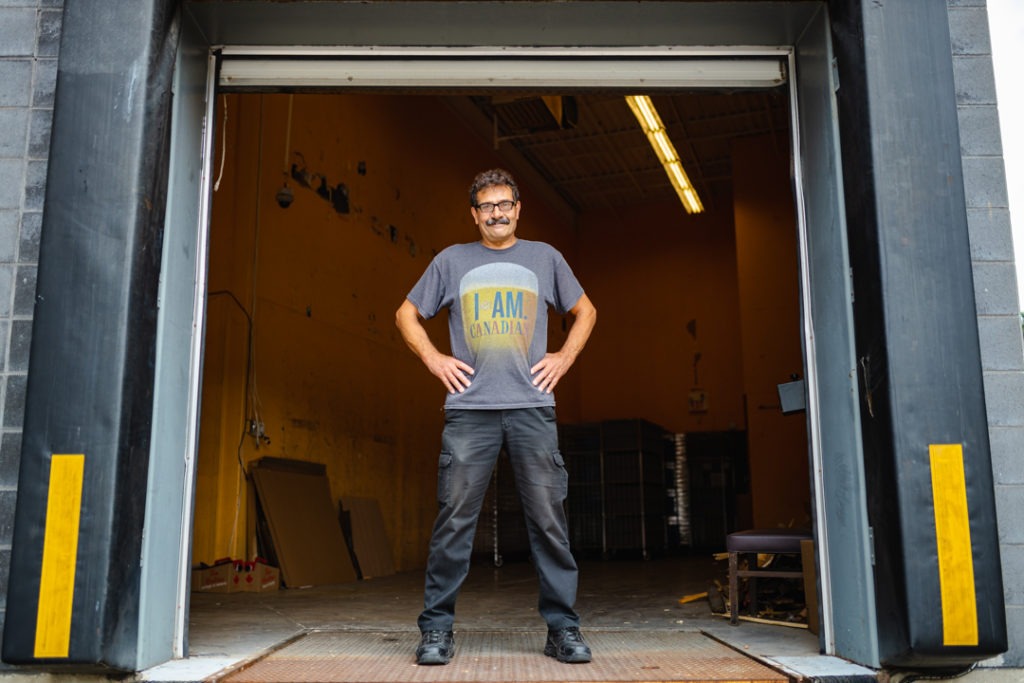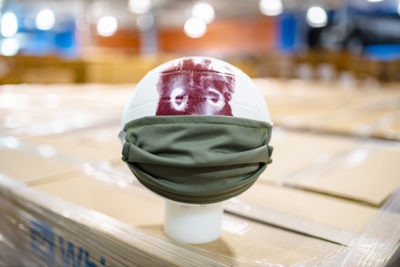
Temporary warehouse offers much needed storage space during pandemic
When the COVID-19 pandemic spread worldwide, sourcing and storing large amounts of Personal Protective Equipment (PPE) became a critical challenge for many health care providers across the country – and Hamilton Health Sciences (HHS) was no exception.
“The standard for using PPE has changed with our response to controlling the risk and spread of COVID-19.”
As part of our pandemic response, the hospital began sourcing PPE early on. However, essential items such as masks and gowns could not be supplied by traditional vendors or through the usual just-in-time replenishment model. The volume of PPE required to meet the needs of staff, physicians, patients and visitors exceeded the regular storage space available on site.
“Hospitals typically store pandemic supplies in an offsite warehouse for events like COVID-19,” says Annette LaCivita, manager of supply chain logistics at HHS. “The impact COVID-19 had on our supply chain meant we had to look further for supplies and purchase larger volumes to meet the expected demand.”
The temporary warehouse HHS sourced to store the extra offers approximately 20,000 sq. ft. of storage space. Real estate investment firm SmartCentres offered the location on a short-term free rental basis to assist HHS in its response to COVID-19.
“We worked with our contact at SmartCentres to review the space needs and to determine what might be available with the loading dock features needed. Several options were reviewed, and this one provided the best solution,” LaCivita explains. “We’re tremendously grateful to work with a community partner who stepped up and provided the needed space for free.”
Increased PPE Usage
So how much PPE has HHS been using? LaCivita says it’s an important question that drove collaboration with the hospital’s business intelligence team to develop tools to fully inform demand and utilization. That also supported mandatory Ministry of Health reporting, a requirement for all hospitals that provides much broader perspective on the supply status and needs.
“The standard for using PPE has changed with our response to controlling the risk and spread of COVID-19,” she says. “Universal masking requires all staff use a mask where many would not have used PPE before. We are also masking visitors which is not a supply pressure we have had before.”
LaCivita’s team needed extra help for a task of this volume. Joe Makadi, Materials Handler for the warehouse, was lured away from retirement to assist with the logistics team’s COVID-19 response.
“I was enjoying retirement, but it’s been great to be back at work and I’ve learned so much about the supplies,” says Makadi. “It can be challenging to keep the space organized as orders come in.”
Makadi retired near the end of 2018 – long enough to relax a little but he’d also been looking for some work to keep busy. Before his retirement, he was a material handler at Juravinski Hospital (JH), making him familiar with the work required for the temporary warehouse.
Staffing is kept to a minimum at the warehouse. A typical day includes receiving orders and coordinating storage that ensures the supplies are organized, identified, and easily accessed for transfer as required. He receives requests from various HHS sites and processes these orders throughout the week.
Meet Wilson

Wilson the volleyball with reusable mask
Since Makadi runs solo in the warehouse, his wife thought a little humour would go a long way in keeping his spirits up. She gave him a gift to mimic ‘Wilson’, the volleyball Tom Hanks’s character befriended in the movie, Castaway. Wilson keeps Makadi company at the warehouse.
Since establishing the temporary warehouse, LaCivita says, “the most rewarding things have been the successful sourcing of critical PPE and other supplies, the collaborative efforts of many to quickly create the space, and the systems to inform demand, decision making and reporting requirements.
“Joe has been an incredible asset to our team in supporting that work.”
